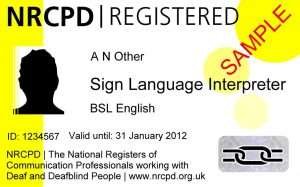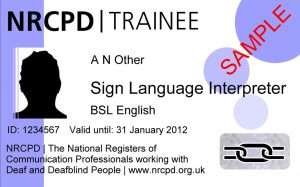Your right to reasonable adjustments
The Equality Act 2010 protects you from discrimination. You have a right to ‘reasonable adjustments’ if it is too difficult for you to access services, activities or work opportunities. If you are Deaf and use BSL, a reasonable adjustment might include providing a BSL interpreter.
Important: If a business is small and cannot afford to provide an interpreter, they can make other reasonable adjustments e.g. write things down
If you are not sure what to say or how to ask for an interpreter, you can copy the letter below and paste it into an email. We have copied the structure of a template letter from Scope as a guide.
Template Letter
(Your address)
(Date)
(the business name and address)
Dear Sir,
Subject: Reasonable adjustments request
I am writing to ask if you can book a BSL interpreter.
I am Deaf and use BSL as my first language so I cannot access your service.
The Equality Act 2010 says that you have a duty to make reasonable adjustments for disabled customers when a person is at a substantial disadvantage compared with a customer who is not disabled. As a Deaf person, I am at a substantial disadvantage because I use BSL to communicate and cannot access written or spoken English. The law says you must take reasonable steps to address this. These include:
- changing policies, procedures, and practices
- changing the physical environment
- providing extra aids and services
I believe that as a disabled person, under the Equality Act 2010 I am entitled to the reasonable adjustments I have requested.
I look forward to receiving your reply within 14 days.
Yours sincerely
(Your name)
The Equality Duty:
The Equality Duty applies to the public sector which includes:
- Police
- Hospitals, GPs, NHS Dentists
- Fire
- Councils
- School, college, and university
The Equality Duty is stricter than just making reasonable adjustments. These organisations have to:
- Make reasonable adjustments
- Remove barriers that prevent you from accessing services.
- Put adjustments in place to meet your needs.
Public services must provide a BSL interpreter if you ask for one, they cannot refuse. Refusing to make reasonable adjustments is unlawful. You can complain if you feel you have experienced discrimination.
How to complain:
The Disability Justice Project has lots of useful guides about your rights to reasonable adjustments. The site has BSL videos that explain your right to accessible information. The clip below is from the Justice Project:
Where to find the BSL Interpreter Register:
There are some situations where you might need to book an interpreter yourself e.g. for a job interview. You can apply to Access to Work to pay for the interpreter service. You can find more information about this on the Deaf-friendly work page.
The National Register for Communication Professionals working with Deaf People (NRCPD) holds the list for registered BSL interpreters. You can find other communication professionals on this list too. All registered interpreters will have an NRCPD badge. Registered interpreters are happy to show you their badge if you ask them.
A fully qualified BSL interpreter has a yellow badge:

A trainee interpreter has a purple badge:

If a service provider does not understand why or how to book an interpreter, you can share the Interpreter Awareness Guide from the National Union of BSL Interpreters (NUBSLI) website.
Hot tips for working with interpreters
- After you have introduced yourself, it is your right to ask the interpreter’s name and qualification status. You could ask additional questions to establish if they have interpreted in a similar environment.
- It is important to be comfortable with an interpreter – they may sign differently to what you are used to or use regional variations – it helps if you get background information during your initial discussions
- Expect questions from the interpreter – e.g. there may be regional variations, s/he has not seen before
- Feedback is essential for interpreters so if you don’t understand their signing – tell the interpreter! It is not rude, you are there to get information and everyone’s time is wasted if you dont understand what is going on.
- If possible, prepare meeting notes or an explanation of any terminology that is likely to be used
- Ask hearing people to speak directly to you, not the interpreter.
- Be aware that BSL does not translate word for word into English and vice versa
- Let the interpreter know your preference – BSL or SSE
Need more information?
BSL video: UN Convention on the Rights of Persons with Disabilities

